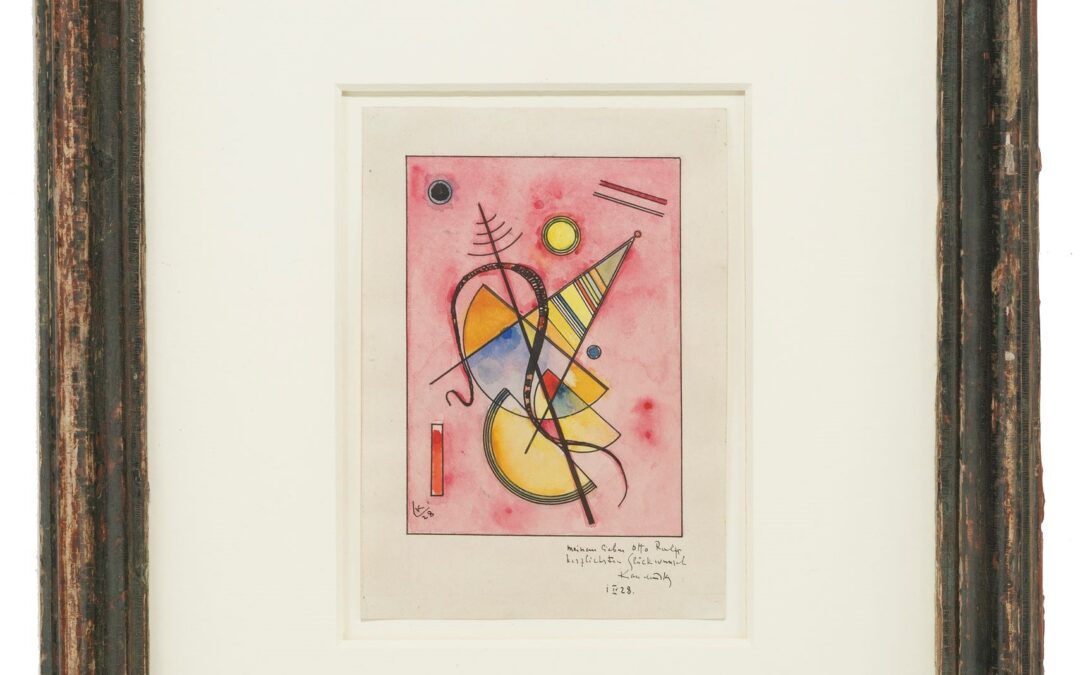Poland has condemned the sale yesterday in Berlin of a painting by Wassily Kandinsky that it says was stolen from the National Museum in Warsaw. A Polish diplomat sought to intervene to prevent the sale, and the government says it will now take legal action.
However, the auction house that oversaw the sale says it carried out proper due diligence and that “there is no basis” for any legal claim.
Niemiecki dom aukcyjny zachował się jak zwykły paser: sprzedał Kandinskiego, mimo że wiedział, że pochodzi z kradzieży z polskiego muzeum… https://t.co/wrVIBA2IuJ
— Piotr Gliński (@PiotrGlinski) December 1, 2022
“The German auction house is behaving like a common fence,” tweeted culture minister Piotr Gliński last night. “It sold the Kandinsky despite knowing that it was stolen from a Polish museum.”
The 1928 work was sold yesterday for €310,000. However, Poland’s culture ministry says that it was stolen from the National Museum in Warsaw in 1984, and notes that it still has the museum’s seal on its back.
The ministry’s officials came across the painting while monitoring foreign art markets. Poland pays close attention to such markets as it seeks to secure the return of hundreds of thousands of items still missing after being looted or destroyed during World War Two.
‼ 𝐏𝐈𝐋𝐍𝐄 ‼ 𝐏𝐨𝐦𝐢𝐦𝐨 𝐬𝐩𝐫𝐳𝐞𝐜𝐢𝐰𝐮 #MKiDN 𝐨𝐫𝐚𝐳 @PLinDeutschland 🇩🇪 niemiecki dom aukcyjny Grisebach wystawił na sprzedaż akwarelę Kandinskiego „Kompozycja” (1/2) pic.twitter.com/HDRrL563Ns
— Ministerstwo Kultury i Dziedzictwa Narodowego (@kultura_gov_pl) December 1, 2022
“The provenance of the work indicated by the Grisebach auction house clearly shows that the painting was in Polish public collections and, more importantly, the painting has markings clearly indicating its origin from the National Museum in Warsaw,” said Poland’s consul to Germany, Marcin Król, quoted by Onet.
“The auction house was asked by the Polish Ministry of Culture and National Heritage to withdraw the painting from the auction, which is the only correct and moral action in this situation,” he added. “Any sale after the moment of theft cannot be considered acting in good faith…[and] deserves strong condemnation.”
Król also announced that Poland has sent a notification to Interpol’s database of stolen art about the Kandinsky painting.
Berliński Dom Aukcyjny Grisebach sprzedał akwarelę Kandinskiego „Kompozycja” za 310 tys. EUR. Obraz został skradziony w 1984 roku z Muzeum Narodowego w Warszawie. pic.twitter.com/dHZ2MZyIcu
— Marcin Król, Konsul RP w Berlinie (@krol_rp) December 1, 2022
The current director of Warsaw’s National Museum, Łukasz Gaweł, said that he was “not only hurt that a stolen work of art is being sold, but that a German auction house is undertaking” the sale, given “the losses of Polish culture during World War Two” during Nazi Germany’s occupation.
However, in statement quoted by Berliner Zeitung, the head of the auction house, Diandra Donecker, said that they had “checked everything that we put into the auction, all due diligence requirements have been taken into account”.
“The legal review has determined that there is no basis for any claims to the image,” she added. Berliner Zeitung reports that the painting was owned by the National Museum in Warsaw from around 1965 to 1983, after which it ended up in a private US collection before being acquired by a German collector in 1988.
That claimed history of the painting is, however, contradicted by a 1982 article from Przekrój, a Polish magazine, which said that the work was purchased by the National Museum in that year, reports the Polish Press Agency (PAP)
W Berliner Zeitung dyrektor zarządzająca i partner w domu aukcyjnym, który sprzedał wczoraj skradziony z polskiego muzeum obraz: „Badanie prawne wykazało, że nie ma podstaw do jakichkolwiek roszczeń do obrazu”. Wie ktoś czy to przedawnienie czy co? https://t.co/VIBRAnzgii
— Patrycja Anna Tepper (@tepper_anna) December 2, 2022
Main image credit: Ministerstwo Kultury i Dziedzictwa Narodowego (under CC BY-NC-ND 3.0 PL)

Daniel Tilles is editor-in-chief of Notes from Poland. He has written on Polish affairs for a wide range of publications, including Foreign Policy, POLITICO Europe, EUobserver and Dziennik Gazeta Prawna.




















